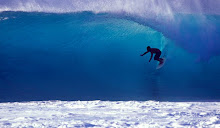
Pop quiz: Which of the above wetsuits is a greener, more earth friendly product? The suit on the left is made using conventional, petroleum based neoprene, whereas the suit on the right employs limestone based rubber, water based inks, and recycled YKK zippers.
So, which suit is a greener more earth friendly product? If you said the suit on the right, you are correct, though not by as far a margin as you might have guessed.
Yesterday the LA Times published a
short piece about Patagonia's* recent
eco-audit which revealed that using limestone based rubber is likely as energy and carbon intensive as using standard petrol based rubber.
So comparing the two suits above, the suit on the right (
Body Glove's ECO 4/3) is a touch more earth friendly by virtue of the recycled zipper and water based inks alone.
Is that enough of a reason to purchase the suit on the right? All other things being equal...yes.
Seahuggers endeavors to use consumer purchasing power to help shape industry. Money talks, and if your dollars approve of recycled zippers and water based inks, then perhaps Body Glove will begin to employ these features in all their suits, not simply the ones carrying an "ECO" designation.
Wouldn't it be great if
every pair of boardies were crafted using recycled soda bottles, or if you could buy
any T-shirt off the rack and know it was manufactured from pesticide free materials?
We think so.
Help us make this happen.
Support industry effort and endorse change.
Aloha
*Seahuggers is proud to say that it will be carrying Patagonia product winter 2008/09.







